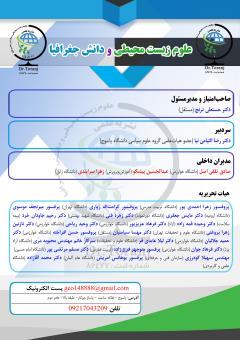نقش آموزش کارآفرینی خودکارآمدی در دانش آموزان ابتدایی
محورهای موضوعی : علوم برنامه ریزیگلنار صالحی خواه 1 , رویا صراط نهایی 2 , مقدس علی محمدی 3
1 - دانشگاه پیام نور یاسوج
2 - دانشگاه زنجان
3 - دانشگاه بابل
کلید واژه: آموزش کارآفرینی, دانش آموزان ابتدایی, محیط یادگیری در فضای باز, خودکارآمدی,
چکیده مقاله :
کارآفرینان تاثیر بسیاری در رشد اقتصادی یک کشور دارند، از این رو پرورش نسل کارآفرین و آماده سازی آنها برای فعالیتهای اقتصادی اهمیت فراوانی دارد. آنچه باعث میشود استعداد کارآفرینی به ورطه عمل آمده و نمود پیدا کند، خودکارآمدی کارآفرینانه است که در نهایت منجر به قصد کارآفرینی میشود. با توجه به ضرورت آموزش کارآفرینی در ترویج کارآفرینی و نیز مناسب بودن دوران کودکی برای ایجاد نگرش عمیق دربارة کارآفرینی, باید برنامه های آموزشی دورة دبستان در راستای آگاهی و تقویت نگرش به سوی کارآفرینی هدف گذاری و اجرا شوند. و از آنجایی که توجه روزافزون محققان به آموزش کارآفرینی، فقدان شواهد تجربی در مورد چگونگی آمادگی برای آموزش کارآفرینی در سنین پایین وجود دارد. بنابراین، این مطالعه به بررسی تأثیر محیط یادگیری در فضای باز و آموزش کارآفرینی بر خودکارآمدی کارآفرینی دانشآموزان میپردازد. یافتهها نشان داد که محیط یادگیری در فضای باز ارتباط تنگاتنگی با آموزش کارآفرینی و خودکارآمدی کارآفرینی دارد. دوم، آموزش کارآفرینی نقش مهمی در میانجیگری رابطه بین محیط یادگیری در فضای باز و خودکارآمدی دانش آموزان دارد. تحقیقات ما بینشی به محققان آینده ارائه می دهد که آموزش ابتدایی نقش مهمی در رشد و توسعه خودکارآمدی و مقاصد کارآفرینی ایفا می کند.
Entrepreneurs have a great impact on the economic growth of a country, therefore, raising the generation of entrepreneurs and preparing them for economic activities is very important. What makes entrepreneurial talent come into action and manifest is entrepreneurial self-efficacy, which ultimately leads to entrepreneurial intention. Considering the necessity of entrepreneurship education in promoting entrepreneurship and the appropriateness of childhood to create a deep attitude about entrepreneurship, educational programs of primary school should be targeted and implemented in order to raise awareness and strengthen attitudes towards entrepreneurship. And as researchers increasingly pay attention to entrepreneurship education, there is a lack of empirical evidence on how to prepare for entrepreneurship education at an early age. Therefore, this study investigates the effect of outdoor learning environment and entrepreneurship education on students' entrepreneurial self-efficacy. The findings showed that the outdoor learning environment is closely related to entrepreneurship education and entrepreneurial self-efficacy. Second, entrepreneurship education plays an important role in mediating the relationship between outdoor learning environment and students' self-efficacy. Our research provides insight to future researchers that early education plays an important role in the growth and development of self-efficacy and entrepreneurial intentions.
• Ansari Z. The effectiveness of computer games on the intelligence beliefs and creativity of third grade high schoo students in Noorabad Mamasani [master’s thesis]. Tehran Payam Nour University; 2019. Persian.
• Atashak M, Baradaran B, Ahmadvand M. [The effect of educational computer games on students’ social skill and their educational achievement. Technology of Education Journal. 2014; 7 (4): 297-305. Persian.
• Bandura A. Regulation of cognitive processes through perceived self-efficacy. Developmental Psychology. 1989; 25 729-735.
• Boyd N, Vozikis G. The influence of self-efficacy on the development of entrepreneurial intentions and actions. Entrepreneurship Theory and Practice. 1994; 18(4): 63-77.
• Campo, J. L. M. (2011). Analysis of the influence of self-efficacy on entrepreneurial intentions. Prospectiva, 9(2), 14-21.
• Fishbein, M., & Ajzen, I. (2011). Predicting and changing behavior: The reasoned action approach. Taylor & Francis.
• Gibb A. In pursuit of a new enterprise and entrepreneurship paradigm for learning: creative destruction, new values, new ways of doing things and new combinations of knowledge. International Journal of Management Reviews. 2002; 4(3): 213- 231.
• Global Entrepreneurship Monitor. Global repot 2016/ 17.
• Gumulak S, Webber S. Playing video games learning and information literacy. Aslib Proceedings. 2011; 63(2/3): 241-255.
• Hasanzadeh, S. 2019. The mediating role of emotional processing styles in the relationship between circadian rhythms and Meta-memory In students. Management and Educational Perspective, 1(1), 103-117.. (In Persian).. doi: https://dx.doi.org/10.22034/jmep.2019.100586.
• Karimi, S. (2019). The Mediating Role of Career Adaptability and Entrepreneurial Self-efficacy between Personality Traits and Entrepreneurial Intentions. Iranian Agricultural Extension and Education Journal, 15(1), 111-126.. (In Persian).. doi:
10.22034/iaeej.2019.93510
• Krueger N, Kickul J, Gundry L, Wilson F, Verma R. Discrete choices, trade-offs and advantages: Modeling social venture opportunities and intentions. 2nd International Social Entrepreneurship Research Conference: 2006: New York, NY.
• McFarlane A, Sparrowhawk A, Heald Y. Report on the educational use of games. TEEM (Teachers evaluating educational multimedia) [non-Journal report]. Cambridge;2002.
• Mohseni A, Mousavi S H, Jamali M. [The role of entrepreneurship training on students’ entrepreneurial attitude and general self-efficiency beliefs]. Quarterly Journal of Research and Planning in Higher Education. 2013; 19 (3):63-8. Persian.
• Newbery R, Lean J, Moizer J. Evaluating the impact of serious games: the effect of gaming on entrepreneurial intent. Information Technology & People. 2016; 29(4): 733-749.; 32(2): 149-166.
• Obschonka, M., & Hahn, E. (2018). Personal agency in newly arrived refugees: The role of personality, entrepreneurial cognitions and intentions, and career adaptability. Journal of Vocational Behavior, 105, 173-184
• Peng, Z., Lu, G., & Kang, H. (2013). Entrepreneurial intentions and its influencing factors: A survey of the university students in Xi’an China. Creative education, 3(08), 95
• Rezaei, M. 2019. The Relationship between Entrepreneurial Self-Efficacy and Entrepreneurial Intention of Agricultural Students at University of Tarbiiat Modarres. Iranian Journal of Agricultural Economics and Development Research, 50(2), 409-419. (In Persian).https://dx.doi.org/10.22059/ijaedr.2019.267959.668669
• Taghavi J M, Hami M. [The effectiveness of the computer games on children's problem-solving ability]. Journal of Instruction and Evaluation . 2018; 11(42): 55-70. Persian.
• Vlachopoulos D, Makri A. The effect of games and simulations on higher education: a systematic literature review. International Journal of Educational Technology in Higher Education. 2017; 14: 22.
• Wilson F, Kickul J, Marlino D. Gender, entrepreneurial self- efficacy, and entrepreneurial career intentions Implications for education. Entrepreneurship Theory and Practice. 2007; 31(3): 378- 406.


